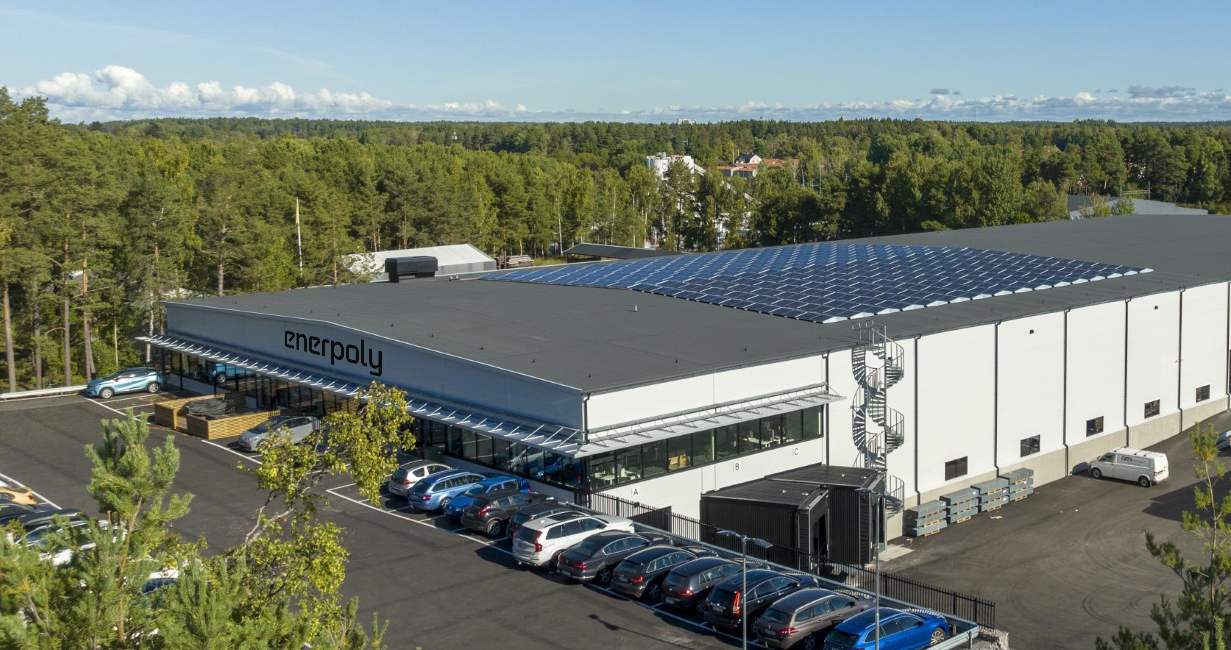Swedish battery manufacturer Northvolt has attracted people from across the globe to join its ranks, making hires with experience of working with the likes of Elon Musk and Jeff Bezos. Now, people are leaving the company to bolster the ranks of other regional energy startups, or set up their own — like Cling Systems, a marketplace for EV batteries, heat optimisation platform Nrlyze, and Rebaba, which recycles EV batteries.
The Northvolt talent factory is helping the next generation of Nordic energy startups flourish, according to Eloisa de Castro, founder of the zinc-ion battery manufacturer Enerpoly, which is today opening its first factory in Rosersberg, half an hour drive north of Stockholm.
“Within technology development, you do sometimes need to have a first mover advantage. And with talent development, a second mover advantage is a very nice thing to have,” de Castro says, commenting on how she’s been able to lure talent like Northvolt’s former head of manufacturing Annika Werneman, as well as two other alums from the company, to join her startup in senior roles.
Zinc instead of Lithium
Enerpoly has patented technology to manufacture what it says are affordable, sustainable and safe zinc-ion batteries. These batteries are suitable for electricity grids and large-scale storage, backup power and safety-critical energy storage applications, including maritime use, critical infrastructure and densely populated urban areas, where batteries must withstand high temperatures without catching fire.
Enerpoly has demonstrated that its battery can endure temperatures exceeding 200°C without igniting.
The clever part, it says, is being able to create batteries for these energy storage applications using materials similar to those found in zinc alkaline non-rechargeable batteries and rechargeable triple A batteries (zinc alkaline).
Normally, batteries for these kinds of grid-level applications have relied on lithium-ion technology — which is well-suited to adapting to fluctuating energy demands, but exposed to global supply chain shortages.
Zinc, meanwhile, is cheaper and more readily available from European sources, according to de Castro.
“That is a far greater and established supply than what you can see from lithium-ion,” she tells Sifted, adding that recycling infrastructure for zinc-ion batteries is also well-established.
Enerpoly says it has established a 100% European zinc supply chain with no need to rely on imports from China, the largest global producer accounting for a third of supply. Sweden is the largest producer of refined zinc in Europe, with the continent as a whole producing 14.8% of the global refined zinc that’s used in batteries.
Scaling up
The company is working towards manufacturing at a scale of 100 megawatt hours per year — the size of the largest battery manufacturer in the UK — at its 70,000 ft sq factory, and plans to start production in 2025, with a full ramp-up expected by 2026.
Enerpoly is targeting battery system integrators and utility companies as its primary customers, and it has several (more than three) collaborative testing agreements in place with European energy companies, according to de Castro.
The company has focused more on grant funding than equity financing to date, having raised €13.5m in grants and €2m in equity, which it has landed from Swedish angel investors.
“The opportunity to have grant funding is essential to being able to bring very, very new deeptech innovation to the market,” says de Castro. “It’s something that you certainly need in the earlier stages and can pave the path forward for getting technology to a stage where you can take on investors.”
“We have been very lucky so far that in our previous fundraising, we were able to identify investors that really had already been involved in the industry.”

The company is now raising its Series A and is looking at a variety of options including grants, debt and equity.
Battery manufacturing has become one of the hottest climate tech sectors in the Nordics since the rise of Northvolt. But in the last year, the large battery manufacturer has had issues meeting its production goals and lost a billion-euro contract with BMW, raising doubts about the industry’s capacity to deliver on its promises.
How Northvolt’s issues might damage the whole sector is not something de Castro wants to comment on but she says that, for Enerpoly, it’s been good to have Northvolt in the same country.
“Having a much larger company in the same space, that has done things first or earlier, is a great advantage when you’re starting a business in the industry. One of the things that has really been helpful for Enerpoly is the availability of talent that has really boomed in Sweden and the Nordics and just in general in the battery industry,” she tells Sifted, adding that she’s also learning lessons from other climate tech sectors outside of batteries.
“We often look at other types of technologies that have been adopted in the industry. Sometimes we take a look at the journeys of the PV (solar) companies to see what has worked for them and what has not. When there’s a lot of competition globally to develop something new, you always have to pay attention to the scalability and the cost.”
Read the orginal article: https://sifted.eu/articles/northvolt-talent-pool-startups-enerpoly/


